Nigeria
Despite Nigeria’s extensive waterways and long coastline, swimming remains a rare skill - especially among children.
Yet here in Lagos, efforts are underway to change that.
A group of visually impaired children are being taught to swim, and in doing so, they’re breaking barriers far beyond the pool.
Each splash is a defiance of the odds in a country where swimming is not part of the school curriculum and access to public pools is scarce.
In rural and underserved urban communities, the dangers of not knowing how to swim are real.
According to the World Health Organization, over 200,000 people drown globally each year, with the vast majority in low and middle income countries.
In Nigeria, the lack of structured swimming education and basic water safety awareness only deepens the problem.
Children aged 1 to 14 are among the most vulnerable, and for children with physical or visual impairments, the risks are even greater.
They’re often excluded from sports and water safety programmes, not because of inability, but because of inaccessibility and a lack of inclusive training.
Even everyday situations, like floods, water storage at home, and leisurely outings can become life-threatening.
Cultural beliefs, too, play a part. In some communities, water bodies are feared — not embraced. Superstitions and economic hardship combine to create a population where generations grow up without ever learning how to swim.
Yet here, the water is a place of freedom, not fear.
For swim coach Emeka Chuks-Nnadi, who founded 'Swim in 1 Day Africa', it’s a powerful tool for inclusion.
He says: “I realised that people living with disabilities are not getting the right therapies and swimming. So, their counterparts living in developed countries are getting this on a regular. And Swimming in 1 Day is all about closing the gap and making it something that people living with disability can also enjoy because it really gives them a better quality of life. Of all the therapies that people living with intellectual disabilities in the world could get, water therapy in swimming is the one that actually affects their brains and has a direct impact.”
Through water, the programme restores dignity and challenges some ideas still present in parts of society.
Chuks-Nnadi continues: “There is a thing in Africa where parents are ashamed of their kids and they have to lock them up, so, educating people, putting word out there and trying to make people understand that your child that is blind or visually impaired could actually become a swimming superstar or a lawyer or a doctor.”
From the first dip to the first unassisted stroke, the impact, says Chuks-Nnadi, is immediate and visible.
“The impact is direct and it’s immediate. When I take a child or an adult that doesn’t know how to swim and I put them in the water, I see immediately the impact, which is that there is a huge transformation that happens. The joy that they express, the gratitude and the love. It’s awesome,” says Chuks-Nnadi.
There’s science behind the emotion too.
Swimming stimulates brain activity, boosts mood, and builds confidence, especially for children with developmental or cognitive challenges.
“The transformation that happens with swim in the water therapy with children with disabilities is enormous. We cannot even start counting the benefits. The benefits is just so huge because these kids, first of all, swimming touches that part of your brain that gets you very excited where you have this good feeling where these kids start doing things and become things that I never expected to see from them. So, every time I’m even at awe, with what happens, because the transformations I’m not controlling, but the transformations are amazing,” says Chuks-Nnadi.
And the children themselves are proof of just how far-reaching those changes can be.
Fikayo Adodo, 14, says: “Swimming have taught me a lot, it has actually helped me a lot, especially in class. I’m very confident now to speak in the crowd, to interact with people. My brain is sharp now, like very great.”
For 10-year-old Boluwatife, swimming has brought courage and pride.
Boluwatife Oladimeji, 10, says: “I was happy when I learned how to swim because I thought I can never do it. But by the courage I build in myself, I can do it and I’m very proud of myself to know how to swim. So, when I go out and they ask me can you swim? Yes, I’ll be proud to say I can swim.”
And for Ikenna, aged 13, the water is more than therapy. It’s a place where fear disappears.
Ikenna Goodluck, 13, says: “Swimming has taught me to face my fears, it has given me boldness, it’s given me courage, it has made me overcome my fears.”
In a country where floods are frequent and water travel is common, these lessons could one day save lives.
But today, they are giving children something just as vital - hope, confidence, and a sense of belonging.




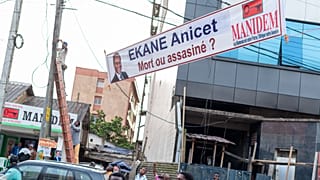
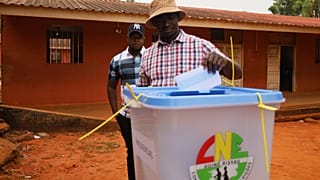

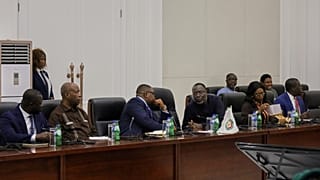

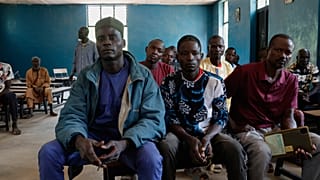
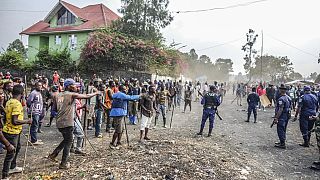
01:11
Hundreds protest in Spain in support of Christians kidnapped in Nigeria
11:17
Simandou iron ore: Guinea’s mega project set to transform global mining [Business Africa]
01:45
Nigerian parents of abducted children say they are being kept in dark
01:22
Nigeria security chiefs report progress in rescuing kidnapped students
01:43
Nigeria: Families of missing children frustrated over frequent school abductions
01:21
Pope Leo XIV calls for release of kidnapped students and priests